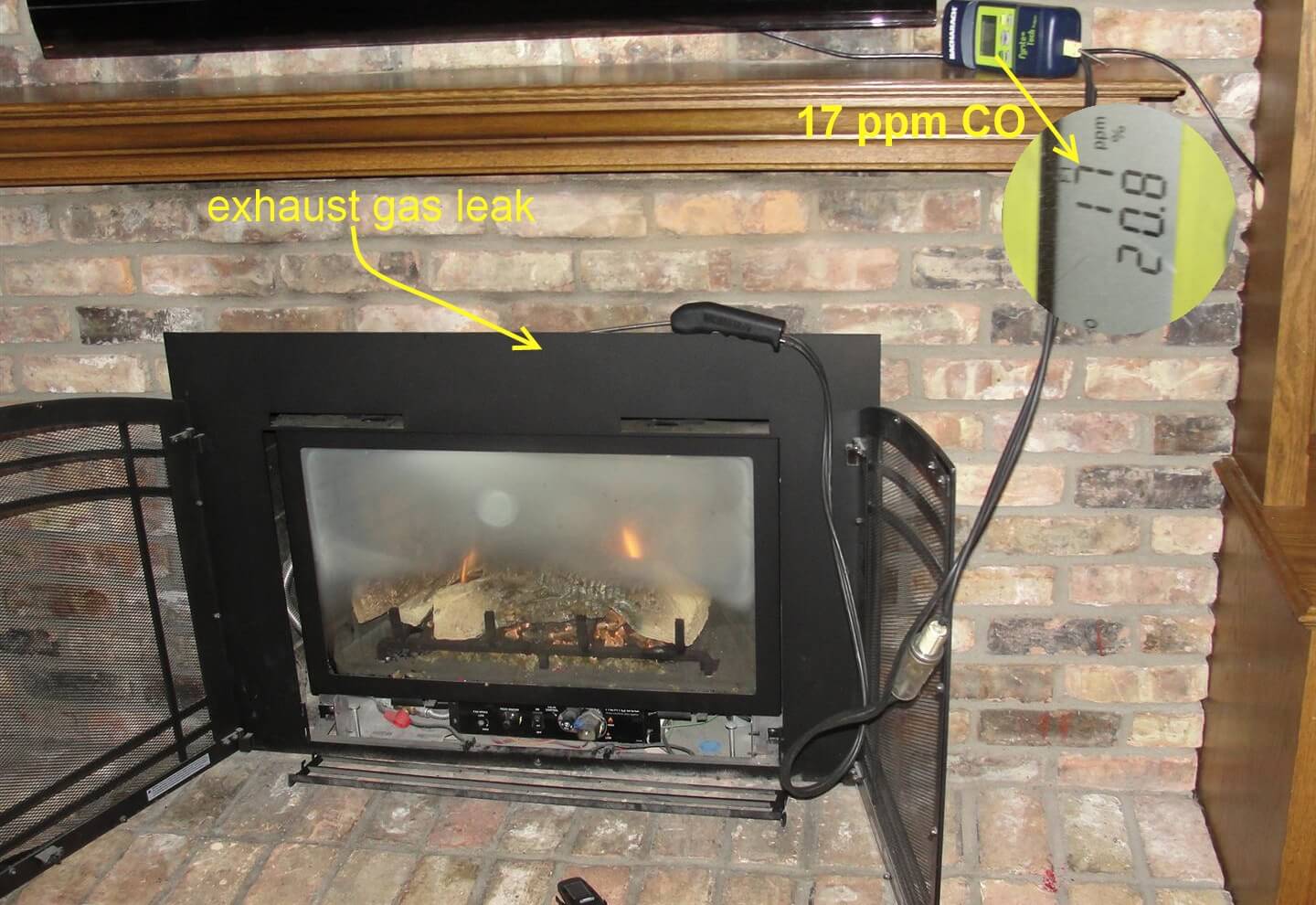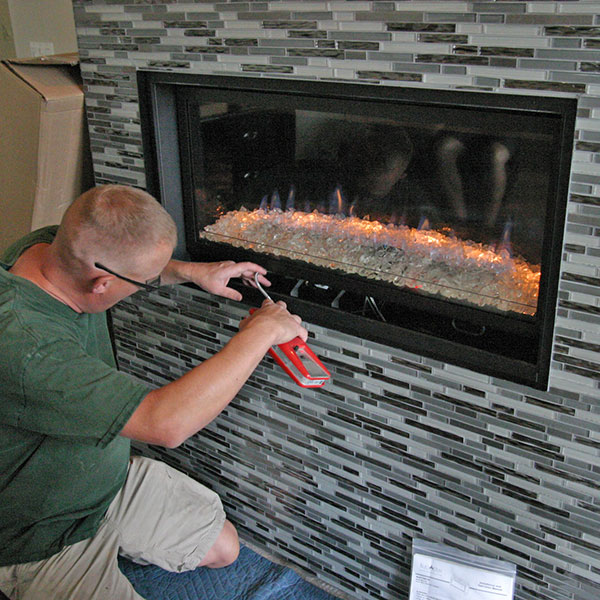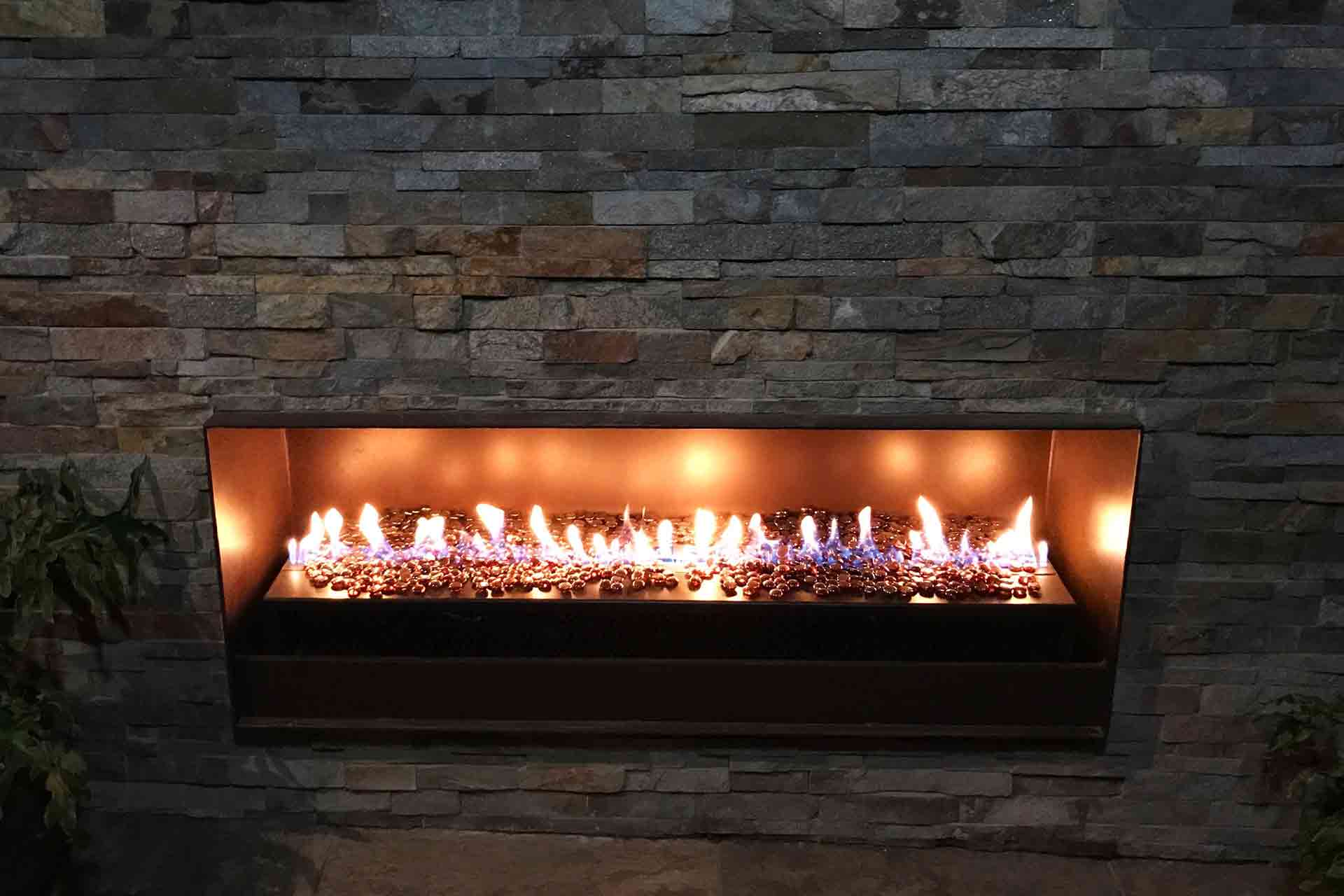Fireplace Gas Leak
A gas fireplace can be the heart of a cozy home, providing warmth and ambiance with just the flick of a switch. However, this convenience comes with risks that every homeowner should understand, particularly when it comes to gas leaks. A gas leak in a fireplace isn’t just an inconvenience; it’s a serious safety concern that can endanger your family and home. Understanding the causes, identifying signs, and knowing the proper safety steps can protect you from a potentially life-threatening hazard. Let’s discuss everything you need to know about fireplace gas leaks, from detection and causes to prevention and response.

Understanding the Basics of Fireplace Gas Leaks
Gas leaks occur when the seal of a gas line or fireplace system is compromised, allowing natural gas or propane to escape. These gases are highly flammable and, in high concentrations, can lead to dangerous explosions. Gas leaks can also be hazardous to your health, as they often emit carbon monoxide (CO), an odorless and colorless gas that can be deadly. Unlike a wood-burning fireplace, gas fireplaces require regular maintenance to ensure their safety and functionality.
Knowing the types of gases used in your fireplace can help you understand the risks. Natural gas and propane are the two most common fuels, and both pose hazards if they leak. Natural gas, often lighter than air, can accumulate in enclosed spaces, creating an explosion risk if ignited. Propane, on the other hand, is heavier than air and can pool at low points, also posing a significant risk. Both types are treated with odorants to make detection easier, but these may not always be sufficient.
While the smell of gas is a crucial indicator of a leak, there are other signs to watch for. For example, unexplained headaches or dizziness may be linked to low-level gas exposure, while more severe symptoms or property damage can signify a larger issue. Recognizing these signals is the first step toward preventing a gas leak disaster.

Signs of a Gas Leak in Your Fireplace
One of the most common indicators of a gas leak in your fireplace is a strong odor of rotten eggs or sulfur. This smell is an artificial additive to natural gas and propane, designed to make leaks easier to detect. However, not everyone has a strong sense of smell, and sometimes the odor can be subtle, especially if the leak is small. Always take a whiff seriously, and don’t hesitate to investigate further if you detect any strange odors around your fireplace.
Another key sign of a fireplace gas leak is condensation on windows and other surfaces in the room. Gas leaks can cause increased humidity levels, leading to excess moisture. If you notice that your windows are fogging up more frequently or there’s an unusual amount of moisture around your fireplace, this could indicate a leak. It’s not a definitive sign, but combined with other factors, it should raise concern.
Additionally, unexplained physical symptoms can also be linked to gas leaks. Mild symptoms like headaches, nausea, and fatigue could be caused by low-level carbon monoxide exposure, a byproduct of burning gas. Prolonged exposure can lead to more severe symptoms, including confusion and unconsciousness. These symptoms often improve when you leave the affected area, so if you feel better after stepping outside, it may be wise to have your fireplace checked for gas leaks.

Causes of Fireplace Gas Leaks
Gas leaks in fireplaces can occur for several reasons, with improper installation being one of the most common. If gas lines or seals aren’t securely fitted during installation, even a tiny gap can allow gas to escape. This is why it’s crucial to have your fireplace installed by a certified professional who understands the nuances of gas lines, seals, and valves. Poor-quality materials or cutting corners on installation can lead to leaks over time.
Another frequent cause of leaks is wear and tear on the system. Over time, seals and connections can degrade, especially if exposed to high heat or fluctuating temperatures. Older gas fireplaces, in particular, are more susceptible to leaks as their parts naturally wear down. Regular inspections can help detect potential weaknesses early on, preventing leaks from developing into major issues.
In some cases, accidents or modifications to the fireplace area can damage gas lines. For instance, knocking into a gas line or moving heavy furniture too close can affect the pipes and connections. Additionally, any home renovations around the fireplace should be done carefully to ensure no damage occurs. Simple awareness and caution can go a long way in preventing these accidental leaks.

Steps to Take If You Suspect a Gas Leak
If you suspect there’s a gas leak in your fireplace, your first priority should be safety. Begin by turning off the gas supply if you know where the shut-off valve is located, and open doors and windows to ventilate the area. Avoid using any electrical switches, as turning on or off lights could potentially ignite the gas. Remember, even a small spark can be enough to cause an explosion in a gas-filled room.
Next, evacuate the area and call for help from a safe location. Do not use your cell phone near the suspected leak site, as this could also create a spark. Contact your gas company or the fire department, as they have the tools and expertise to locate and resolve gas leaks safely. Most gas providers offer emergency services for situations like these and can guide you through the steps to follow until help arrives.
Once the immediate danger is resolved, you’ll need to contact a professional to inspect your fireplace and gas lines. They will be able to repair any damages and check for any underlying issues that may have caused the leak. It’s essential to act quickly, as even a minor leak can escalate if left unchecked, leading to more significant safety risks and potentially costly repairs.

Preventing Gas Leaks in Your Fireplace
Preventative maintenance is the best way to keep your fireplace safe and functional. Schedule annual inspections with a certified technician to assess the condition of your gas lines, seals, and the overall fireplace system. Regular maintenance can catch small issues before they develop into major problems, ensuring that your fireplace remains a safe source of warmth and comfort in your home.
Another vital aspect of prevention is ensuring proper ventilation. A well-ventilated fireplace area reduces the risk of gas build-up in the event of a small leak, as it allows gas to disperse rather than accumulate. Make sure your home has adequate airflow around the fireplace, especially if it’s installed in a confined space. Installing carbon monoxide detectors is also a smart safety measure, as they can alert you to invisible hazards.
Finally, be mindful of any unusual changes in your fireplace’s performance, as this could signal an issue. If you notice changes in flame color, increased condensation, or any new sounds coming from the fireplace, it’s worth having a professional check for potential leaks. By staying proactive, you can help prevent leaks and maintain a safe environment for your household.

Choosing the Right Professional for Gas Fireplace Inspections and Repairs
Hiring a skilled professional is essential when it comes to inspecting and repairing your gas fireplace. Look for technicians certified by organizations like the National Fireplace Institute (NFI) or the Chimney Safety Institute of America (CSIA), as these certifications indicate a high level of training and expertise. An experienced technician will understand the intricacies of gas lines, valves, and fireplace systems, ensuring that any repairs are done safely and effectively.
When choosing a technician, check their references and reviews. A reputable professional should be able to provide references and have a positive track record. Trustworthy reviews can also give you insights into the quality of their work and how they handle customer concerns. It’s wise to avoid choosing based on price alone; quality and safety should always be the top priorities.
Finally, make sure to establish a maintenance routine with your chosen technician. Regular inspections not only keep your fireplace functioning efficiently but also ensure early detection of potential issues. Building a relationship with a reliable professional gives you peace of mind, knowing that your fireplace will be properly maintained and safe for years to come.

What does a fireplace gas leak smell like? – YouTube

Natural gas leak drives 5 families from their homes
/cloudfront-us-east-1.images.arcpublishing.com/gray/CVWRRG6UNNFADBCYAFYWOWEYMM.jpg)
How Much Does a Ventless Gas Fireplace Cost

Gas Fireplace Service & Repair – Frederick MD Gas Fireplace Installation

Spotting a Gas Leak

Does my gas fireplace need cleaning? – The Original Flame

Gas Leak Risk Prompts Recall of Fireplaces, Stoves – YouTube

Related Posts:
- Gas Fireplace Built-in
- Natural Gas Fireplace Regulator
- Fireplace Gas Valve Extension
- Gas Fireplace Heatilator
- Gas Fireplace Components
- Gas Fireplace Hookup
- Gas Fireplace Building Code
- Corner Gas Fireplace Direct Vent
- Fireplace Gas Valve Leaking
- Gas Fireplace Insert Parts
A fireplace gas leak can be a serious safety hazard in any home. Gas leaks can lead to a variety of health risks, including headaches, dizziness, nausea, and even carbon monoxide poisoning. In addition to health risks, gas leaks can also increase the risk of fire or explosion in your home. It is important to take steps to prevent gas leaks and to address them quickly if they do occur.
Benefits of Gas Fireplaces:
Gas fireplaces are a popular choice for many homeowners because they offer several benefits. One of the main benefits of gas fireplaces is their convenience. Unlike wood-burning fireplaces, gas fireplaces are easy to use and require minimal maintenance. They also produce less ash and soot, which means less cleaning for you. Gas fireplaces are also more environmentally friendly than wood-burning fireplaces, as they produce fewer emissions.
Another benefit of gas fireplaces is their efficiency. Gas fireplaces can heat a room more quickly and evenly than traditional wood-burning fireplaces. This can help you save on your heating bills during the winter months. Gas fireplaces also provide a steady source of heat, so you don’t have to keep adding logs or stoking the fire to maintain warmth.
Pros and Cons of Gas Fireplaces:
While gas fireplaces offer many benefits, there are also some drawbacks to consider. One potential con of gas fireplaces is that they require a constant supply of natural gas or propane to operate. This means that you will need to have a gas line or propane tank installed in your home in order to use a gas fireplace.
Another potential con of gas fireplaces is that they may not provide the same ambiance as a traditional wood-burning fireplace. Some people prefer the crackling sound and smell of burning wood that you get with a wood-burning fireplace. However, there are now gas fireplace models available that mimic the look and feel of a traditional fireplace.
Common Mistakes to Avoid:
One common mistake to avoid when it comes to gas fireplaces is neglecting regular maintenance and inspections. It is important to have your gas fireplace inspected annually by a qualified professional to check for any leaks or other issues. Neglecting this maintenance can increase the risk of gas leaks and other safety hazards.
Another common mistake is failing to install carbon monoxide detectors near your gas fireplace. Carbon monoxide is a colorless, odorless gas that can be produced by gas appliances, including fireplaces. Without proper detection equipment, you may not realize that there is a carbon monoxide leak until it’s too late.
How can I tell if there is a gas leak in my fireplace?
If you notice a strange odor resembling sulfur or rotten eggs near your fireplace, this could be an indication of a gas leak.
What should I do if I suspect a gas leak in my fireplace?
If you suspect a gas leak, it is important to leave the area immediately and call your local utility company or emergency services for assistance.
Can I prevent gas leaks in my fireplace?
Regular maintenance and inspections by qualified professionals can help prevent gas leaks in your fireplace.
Are there warning signs I should look out for regarding potential gas leaks?
In addition to strange odors, other warning signs of potential gas leaks include hissing sounds near the fireplace and visible damage or corrosion on the burner or piping.
Is it safe to use a gas fireplace if there is a suspected leak?
No! If you suspect a gas leak in your fireplace, it is important to refrain from using it until the issue has been resolved by a professional.
While gas fireplaces offer many benefits, it is important to be aware of the potential risks associated with them, such as gas leaks. By taking preventive measures and addressing any issues promptly, you can enjoy the warmth and convenience of your gas fireplace safely and efficiently. Remember, safety should always be your top priority when it comes to using gas fireplaces. Be proactive in preventing gas leaks by scheduling regular maintenance and inspections, installing carbon monoxide detectors, and being aware of warning signs of potential issues. If you suspect a gas leak, evacuate the area immediately and seek professional assistance. By taking these precautions, you can enjoy the comfort and efficiency of your gas fireplace with peace of mind.
Remember, safety should always be your top priority when it comes to using gas fireplaces. Be proactive in preventing gas leaks by scheduling regular maintenance and inspections, installing carbon monoxide detectors, and being aware of warning signs of potential issues. If you suspect a gas leak, evacuate the area immediately and seek professional assistance. By taking these precautions, you can enjoy the comfort and efficiency of your gas fireplace with peace of mind. Remember, safety should always be your top priority when it comes to using gas fireplaces. Be proactive in preventing gas leaks by scheduling regular maintenance and inspections, installing carbon monoxide detectors, and being aware of warning signs of potential issues. If you suspect a gas leak, evacuate the area immediately and seek professional assistance. By taking these precautions, you can enjoy the comfort and efficiency of your gas fireplace with peace of mind.